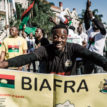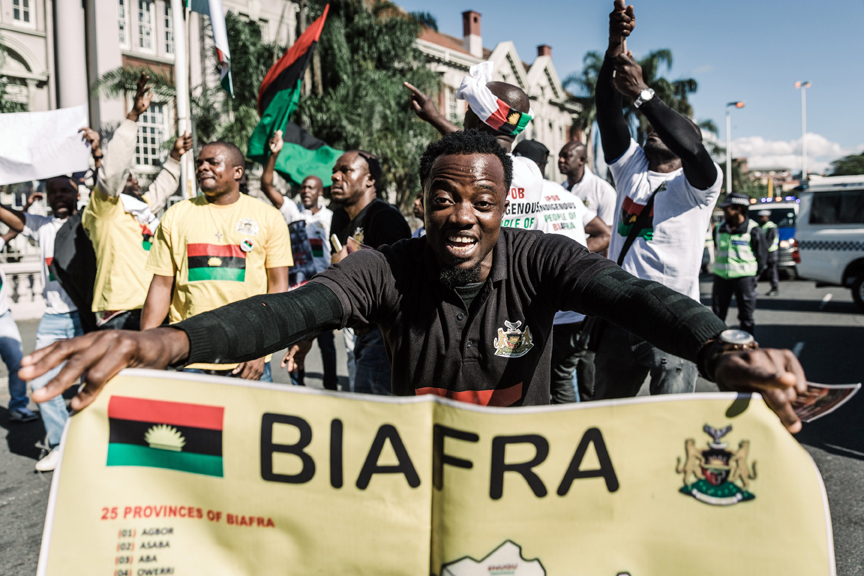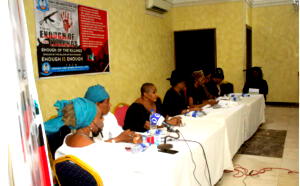A protester brandishes a banner as he takes part in a demonstration in Durban, South Africa, on May 30, 2019 during a freedom march for Bi...


By Douglas Anele
Nigeria is a classic example of a country characterised mostly by false starts, missed opportunities, dashed hopes, and failed leadership. Thus, it is absurd to claim that Nigeria’s unity is not negotiable, which means that the British colonial contraption must be maintained in situ even if a broad section of Nigerians, for good reasons, demand that either it should be reconfigured to form a confederation or dismembered peacefully into separate republics, depending on historical, socio-cultural, and linguistic affinities.
Any attentive student of history knows it is extremely difficult, if not impossible, to build a stable nation where about half of the population is Muslim and the remainder non-Muslim because of the inherent Allah-ordained quest of Muslims to rule over everybody as stipulated in Islamic scriptures. In that regard, the most realistic and enduring solution to most of the political and economic challenges facing Nigeria all along is to reengineer her into a confederationas agreed by Ojukwu and Gowon in January 1967 at Aburi, Ghana.
Presently, Nigeria is in very bad shape. To a large extent the northern military-civilian elite (not the suffering masses there) are the biggest beneficiaries of Nigeria as presently constituted because resources from the south were cleverly funnelled to northerners especially during military dictatorships which foisted unitarist constitutions on the country.
What would have become of the families of Babangida, Danjuma, Abacha, Abubakar, Dangote, Indini, Daura, Buhari, Funtua, Bayero, Saraki and so on if there was an independent Arewa Republic separate from the United States of Oduduwa andNation of the Indigenous Peoples of Biafra that controlled resources in their areas? Answer: they certainly would not have been as obscenely wealthy as they are right now.
Prof. Ango Abdullahi and other Fulani caliphate colonialists who claim that before amalgamation the north was economically viable without the south or that resources in southern Nigeria belong to the north are deceiving themselves. The Biafran war, as I argued earlier, was fought primarily to ensure that the south continues to serve the economic interests of northern region and Britain.
Unfortunately, after the conflict myopic and politically naïve southerners like Chief Rotimi Williams, Prof. Ben Nwabueze, and Justice Akinola Aguda were used by northern military dictators to institute constitutional provisions and policies that ultimately favour the northern ruling power block.
Sir Ahmadu Bello’s claim that the amalgamation of 1914 was a mistake is correct. Non-Muslims blindly supporting One Nigeria are unaware that the Koran and Hadith enjoin Muslims not to acquiesce to leadership by non-Muslims and that they should endeavour to impose Allah’s law, sharia, in countries with significant Muslim population. For a devout Muslim, leadership by non-Muslims in secular democracy is against the will of Allah.
Meanwhile, the history of the Fulani in West Africa, like that of Islam, is essentially a violent succession of military conquests. That is why since Uthman Dan Fodio’s politically motivated jihads about two centuries ago prominent Fulani rulers have patiently but unwaveringly nursed the ambition of dipping the Koran into the sea and making Nigeria an Islamic state.
It also explains,inter alia, the otherwise perplexing enrolment of Nigeria in the Organisation of Islamic Countries (OIC) by Gen. Ibrahim Babangida; Buhari’sodious public support of Boko Haram and its Islamisation agenda; his brazen nepotism and northernisation of the security architecture together with critical sectors of the Nigerian economy such as the Petroleum Ministry, Customs, and Nigeria Ports Authority; Myetti Allah’s conquistadorial attitude to the south; and the on-going incursion of armed Fulani herdsmen and potential fighters into southern Nigeria.
READ ALSO: The unending quest for the sovereign state of Biafra (3)
All this seems to be the unfolding of a grand plan for eventual takeover of the entire country by the Fulani in Nigeria and their tribesmen from other parts of West Africa. Northerners with born-to-rule mentality and dullards from the south who support One Nigeria sheepishly would dismiss these claims with their usual empty vituperations. That does not matter at all because truth cannot be suppressed by insults, threats and intimidation.
Unless northern leaders change from their ruinous self-centred obsession with Nigeria as presently constituted, give up the unreasonable desire for perpetual political domination, and allow the country to be reconfigured into a confederacy, the quest for Biafra will continue to recur like an ogbanje until the issue is resolved either peacefully or violently. Nnamdi Kanu’s IPOB has been peaceful in their agitation for self-determination.
But the government of President Buhari has treated it with iron fist and disdain, which might force the group to embrace violence due to the fact that whenever diehard agitators for political freedom become convinced that peaceful change cannot happen under the prevailing circumstances they usually take up arms. Of course, Nigeria relies on the northern dominated military to crush IPOB or any other separatist movement.
But 2020 (or any year thereafter) is not 1967. In some significant respects, things are not as they were fifty-three years ago, and there is no guarantee that any future civil war will end the same way as the 1967-1970 conflict. Now, if the root causes of Igbo bitter resentment towards Nigeria is not addressed with a mindset radically different from the longstanding jackboot or slavemaster’s attitude of the powers that be, a much more violent Biafra separatist movement might arise in the future.
Therefore, all right-thinking Nigerians should demand that the current rulers must work for peaceful resolution of the National Question because wars, in general, are too costly and devastating. Moreover, for Ndigbo horrible memories and scars of the civil war have not disappeared completely.
Oppression and marginalisation tend to generate centrifugal forces which often lead to armed confrontation. Wise statesmen take steps to mitigate such forces by engaging sincerely, patiently, with those who feel aggrieved for whatever reason in order to reach an amicable compromise that substantially addresses the core issues at stake.
Unwise rulers tend to worsen matters through the arrogance of power and hubris of negative triumphalism. Clearly, for selfish reasons and cowardice mainstream Igbo elite do not endorse IPOB’s peaceful agitation for referendum as a prelude for the resuscitation of Biafra. But who knows what would happen tomorrow? Hot-headed IPOB members may jettison Nnamdi Kanu’s peaceful approach and embrace violence.
Still, I believe that the agitation for referendum by IPOB or any other organisation should be given serious consideration by the government. The painful irony in the case of Biafran agitation is that people from other parts of the country resent Ndigbo and regularly complain bitterly about them and, yet, when the people demand independence so that they can create a nation for themselves, the same Nigerians, particularly from the north, insist that all of us must remain in Nigerian no matter what, to the extent of threatening war against the Igbo.
Let me end this discourse with an analogy. Supposing that despite irreconcilable differences a powerful stranger, B, compelled N to marry two rich resourceful women, W and E, without their consent primarily because B and N would benefit from the union. After several years of bitter experiences, E tries to quit the toxic marriage but was violently forced to remain by N supported by B, W, and others. Certainly, such a joyless relationship for E would make progress and smooth functioning of the family somewhat impossible, such that divorce might be the best solution.
If E insists on leaving the marriage and N remains obdurate, something terrible might happen later given that the quest for freedom in the face of oppression is embedded in the human psyche. Those with discerning minds can easily distil the salient points in the matrimonial analogy and reach their own conclusions.
Concluded.
The post The unending quest for the sovereign state of Biafra (4) appeared first on Vanguard News.

No comments